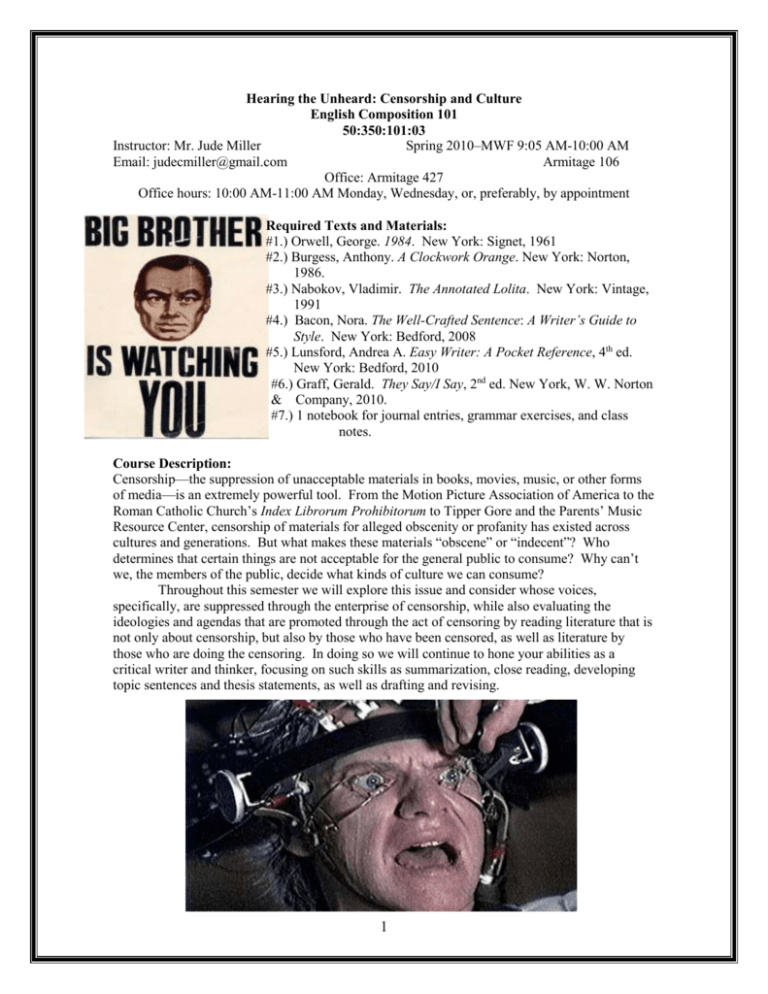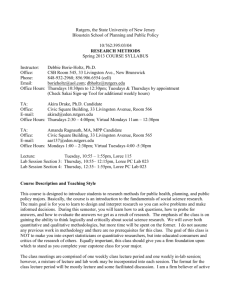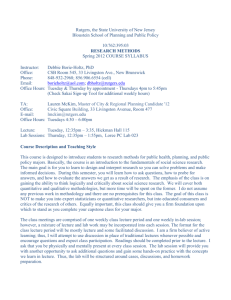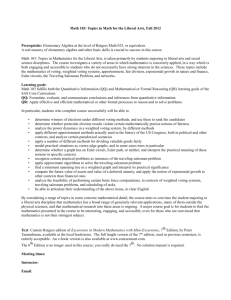English Composition 101-Hearing the Unheard: Censorship and
advertisement

Hearing the Unheard: Censorship and Culture English Composition 101 50:350:101:03 Instructor: Mr. Jude Miller Spring 2010–MWF 9:05 AM-10:00 AM Email: judecmiller@gmail.com Armitage 106 Office: Armitage 427 Office hours: 10:00 AM-11:00 AM Monday, Wednesday, or, preferably, by appointment Required Texts and Materials: #1.) Orwell, George. 1984. New York: Signet, 1961 #2.) Burgess, Anthony. A Clockwork Orange. New York: Norton, 1986. #3.) Nabokov, Vladimir. The Annotated Lolita. New York: Vintage, 1991 #4.) Bacon, Nora. The Well-Crafted Sentence: A Writer’s Guide to Style. New York: Bedford, 2008 #5.) Lunsford, Andrea A. Easy Writer: A Pocket Reference, 4th ed. New York: Bedford, 2010 #6.) Graff, Gerald. They Say/I Say, 2nd ed. New York, W. W. Norton & Company, 2010. #7.) 1 notebook for journal entries, grammar exercises, and class notes. Course Description: Censorship—the suppression of unacceptable materials in books, movies, music, or other forms of media—is an extremely powerful tool. From the Motion Picture Association of America to the Roman Catholic Church’s Index Librorum Prohibitorum to Tipper Gore and the Parents’ Music Resource Center, censorship of materials for alleged obscenity or profanity has existed across cultures and generations. But what makes these materials “obscene” or “indecent”? Who determines that certain things are not acceptable for the general public to consume? Why can’t we, the members of the public, decide what kinds of culture we can consume? Throughout this semester we will explore this issue and consider whose voices, specifically, are suppressed through the enterprise of censorship, while also evaluating the ideologies and agendas that are promoted through the act of censoring by reading literature that is not only about censorship, but also by those who have been censored, as well as literature by those who are doing the censoring. In doing so we will continue to hone your abilities as a critical writer and thinker, focusing on such skills as summarization, close reading, developing topic sentences and thesis statements, as well as drafting and revising. 1 Grading Scale: I assign grades to all work so that you and I can measure your progress throughout the semester. I apply the following grading scale to all quizzes, papers, drafts, and other assignments: A = 100-90% B+ = 89-85% B = 84-80% C+ = 79-75% C = 74-70% D = 69-60% F = 59-0% Grade Distribution: Attendance: 5% Participation: 5% Quizzes: 5% Journals: 5% Paper One: 20% Paper Two: 20% Paper Three: 20% Paper Four: 20% Course Policies: Attendance and Lateness: Every student is expected to attend every class session. The general college attendance policy limits absences to a total of four (4) during a fifteen week semester. Therefore, any student who is absent more than four (4) times during this semester will not receive credit for this course. Students who arrive to class more than 15 minutes late will receive a half-day absence which will be factored in with any potential regular absences. To summarize, having nine latenesses is equivalent to four (4) absences. Since no student is permitted to be absent more than five times per semester, any student who is late to class more than eight times will not receive credit for this course. Moreover, since no makeup quizzes will be given, students who arrive late to class on the day of a quiz (announced or unannounced) will receive an “F” for the corresponding quiz. If a student is late or absent, it is that student’s responsibility to contact a fellow student and review the contents of the class that was missed. Equally, as this syllabus is subject to change throughout the semester as the professor sees fit, attendance and punctuality are crucial to finding out about any potential amendments to the syllabus. Assignment due dates are not extended for absences. Late assignments are marked down one-half letter grade (or five points) for every day that they are late. As stated below, assignments are considered late until I am holding a physical, printed copy in my hands. I will not accept email transmissions or papers left in my mailbox, unless you have an excuse that is both documented and University-recognized. 2 Submission of Papers: All papers must be typewritten and in proper MLA format: 12-point font, Times New Roman, with 1” margins, not 1.25” (the Microsoft Word default setting). All handwritten papers will be immediately returned until they are typewritten. Moreover, this will cost you a five-point deduction from your paper grade since it will be marked late. Please note that I will not accept electronic copies of your work under any circumstances. The rules for submitting your work are simple and finite: if you would like to receive full credit for an assignment, you must submit a physical copy to me in class on the day that it is due. Note also that it is critical to your grade for this course that you submit every assignment listed on the syllabus. Failure to hand in any one assignment will not only result in a failing grade for that individual assignment, but also jeopardize your grade for the course. Sakai: Our course website at sakai.rutgers.edu provides essential information (syllabus, assignments, etc.). Develop the habit of regularly checking our Sakai page for announcements, discussion questions, and new assignments. In an effort to reduce waste, I will post all assignments on Sakai. I will not distribute paper assignment sheets, although you may print paper assignments from Sakai for your personal records. Also, I recommend using your Sakai dropbox to save drafts and revisions, as it is a convenient and stable location to store your work electronically. There will, furthermore, be a number of mandatory reading assignments posted on Sakai regularly, so it, again, is utterly imperative that you frequently check our course’s Sakai site to stay on top of the required reading assignments for this semester. Any readings that will be posted on Sakai are listed as such on the on the schedule of assignments. Turnitin.com: You must post all drafts on Turnitin.com. At the beginning of the semester I will send uploading directions via email. For each draft due date, you must submit a hard copy in class and an electronic copy to Turnitin.com. Email: It is imperative for this course that you have a NetID account. All information for this course will be sent to your Rutgers email account. If you haven’t established an account, please visit http://oit.rutgers.edu/services/account/quick.html and follow the link for Camden students. Classroom Etiquette: Please come to every class prepared to participate and learn. Please turn off any and all cell phones, beepers, pagers, blackberries, devices with a “chirp” feature, sidekicks, iPhones, personal computers, PDAs, and any other electronic devices that would disrupt the classroom. If you do arrive late to class, enter the room as inconspicuously and quietly as possible as to not disrupt those who arrived on time. Participation: Your comments and contributions to the class are appreciated and valued. Moreover, your participation is graded; therefore, it is imperative that you have all the assignments read before you come to class and are prepared for discussion. Plagiarism: Plagiarism is not only unethical, it is illegal. It is, furthermore, a violation of Rutgers University’s Academic Integrity Policy. When you use someone else’s words or ideas without properly citing that information as belonging to someone else you have committed theft of another person’s intellectual property. I am required to bring any potential instances of plagiarism directly to The Dean, at which point the issue is out of my hands entirely. If you 3 would like to familiarize yourself with Rutgers University’s Academic Integrity policy, you can find it clearly spelled out at the following site: http://academicintegrity.rutgers.edu/integrity.shtml Peer Editing sessions: Peer editing can be an extremely useful activity. We will have mandatory peer edit sessions for each one of our written assignments in this class. Anyone who fails to bring at least one physical, printed copy of his or her work to a peer edit session will be asked to leave the classroom and will not receive attendance or participation points for the day. Tutoring: As with my office hours, I hope that you’ll seek additional help at the Rutgers-Camden Learning Center when you’re having difficulty with grammar and writing. I’ll require that you attend a mandatory 3-visit tutoring session for specific issues affecting your work in the course should necessity dictate my intervention. Feel free to schedule an appointment with the RLC at your personal discretion. To proceed, please go to 231-ATG and schedule a session, or visit http://accutrack.camden.rutgers.edu/accuweb/ to schedule online. Health Services: Rutgers-Camden Student Health Services is a multipurpose resource available to all RutgersCamden students. It provides health care to students, which includes substance abuse counseling, psychological counseling, health promotion, immunizations, specialist referrals, and student health insurance. Should you need help with any of the aforementioned concerns, please visit Rutgers-Camden Student Health Services at 326 Penn Street, on the second floor of the Campus Center. For more information, call (856) 225-6005 or visit Health Services online at http://healthservices.camden.rutgers.edu/. Emergencies: In case of inclement weather, you may either check the college’s website, www.rutgers.edu, or call the college’s main number at (856) 225-1766 Tentative Schedule of Assignments and Activities: This schedule of assignments is tentative. Therefore, the professor has the right to change, reschedule, remove, and add assignments as he sees fit. Week #1 Wednesday 1/19 Introduction to course In-class writing assignment: What It Means to be Censored Friday 1/21 “Harrison Bergeron” by Kurt Vonnegut (Sakai) In-class grammar assessment Week #2 Monday 1/24 “Unhappy Meals” by Micheal Pollan (Sakai) Wednesday 1/26 Barbara Ehrenriech’s speech for Breast Cancer Action (Sakai) 4 Friday 1/28 Clockwork Orange Grammar Quiz Week #3 Monday 1/31 Clockwork Orange Wednesday 2/2 Clockwork Orange Friday 2/4 Clockwork Orange Grammar Quiz Week #4 Monday 2/17 Clockwork Orange Wednesday 2/9 Clockwork Orange Friday 2/11 Grammar Quiz Peer Edit: Paper #1. You must bring at least one (1) printed copy of your work to class. Anyone who fails to bring a printed copy will be asked to leave and will lose attendance points for the day. Week #5 Monday 2/14 “Maslow’s Pyramid” and analysis of ads (Sakai) Paper #1 Due Wednesday 2/16 “Maslow’s Pyramid” and analysis of ads (Sakai) Friday 2/18 “Maslow’s Pyramid” and analysis of ads (Sakai) Grammar Quiz Week #6 Monday 2/21 “Maslow’s Pyramid” and analysis of ads (Sakai) Wednesday 2/23 Lolita Friday 2/25 Grammar Quiz Peer Edit: Paper #2. You must bring at least one (1) printed copy of your work to class. Anyone who fails to bring a printed copy will be asked to leave and will lose attendance points for the day. 5 Week #7 Monday 2/28 Lolita Paper #2 Due Wednesday 3/2 Lolita Friday 3/4 Lolita Grammar Quiz Week #8 Monday 3/7 Lolita Wednesday 3/9 Lolita Friday 3/11 Lolita Grammar Quiz Peer Edit: Paper #3. You must bring at least one (1) printed copy of your work to class. Anyone who fails to bring a printed copy will be asked to leave and will lose attendance points for the day. Spring Break: 3/12-3/20 Week #9 Monday 3/21 Lolita Paper #3 Due Wednesday 3/23 Lolita Friday 3/25 Orwell: “Politics and the English Language” (Sakai) Grammar Quiz Week #10 Monday 3/28 1984 Wednesday 3/30 1984 Friday 4/1 1984 6 Week #11 Monday 4/4 1984 Wednesday 4/6 1984 Friday 4/8 1984 Week #12 Monday 4/11 1984 Wednesday 4/13 “On Morality” by Joan Didion (Sakai) “On Keeping a Personal Notebook” by Joan Didion (Sakai) Friday 4/15 “Kenyon College Commencement Speech” by David Foster Wallace (Sakai) Week #13 Monday 4/18 “Sex Lies and Conversation” by Deborah Tannen (Sakai) Wednesday 4/20 Peer Edit: Paper #4. You must bring at least one (1) printed copy of your work to class. Anyone who fails to bring a printed copy will be asked to leave and will lose attendance points for the day. Friday 4/22 This Film is Not Yet Rated Week #14 Monday 4/25 This Film is Not Yet Rated Wednesday 4/27 This Film is Not Yet Rated Friday 4/29 This Film is Not Yet Rated Week #15 Monday 5/2 Quiz: In-Class Writing Assignment: This Film is Not Yet Rated Closure and Reflections Journals due Paper #4 Due 7







